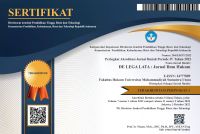Analysis of Greenwashing Policy in Providing Consumer Protection in Indonesia in View of Act Number 8 of 1999 Concerning Consumer Protection
Abstract
Keywords
Full Text:
PDFReferences
A. Langer, M. E. (2008). The Impact Of Eco-Labels On Consumers: Less Information, More Confusion? European Advances In Consumer Research, Vol. 8, 338-339.
Adi, R. (2015). Aspek Hukum Dalam Penelitian. Jakarta: Yayasan Pustaka Obor Indonesia.
Aktuaran. (n.d.). How Does Greenwashing Affect Green Branding Equity and Purchase Intention? An Empirirical Research, Marketing Intelligence and Planning. Vol. 36, Issue 7, 811.
Apsari, E. E. (2021). Telahh Kebijakan Sustainable Consumption and Production (SCP) dalam Merespons Fenomena Greenwashing di Indonesia Pada Era E-Commerce. Jakarta: Indonesian Center For Environmental Law.
Erman Rajagukguk, S. N. (2000). Hukum Perlindungan Konsumen. Bandung: Mandar Maju.
Kaydan, A. d. (2009). Greenwashing: The Darker Side of CSR. Indian J. Appl. Es, 270-286.
Kehutanan, K. L. (2020). Kerangka Kerja Strategi Pencapaian Konsumsi dan Produksi Berkelanjutan Indonesia Tahun 2020-2030. Jakarta: KLHK dan Bappenas.
Kristiyanti, C. T. (2009). Hukum Perlindungan Konsumen. Jakarta: Sinar Grafika.
Marzuki, P. M. (2007). Penelitian Hukum. Jakarta: Kencana.
Maxwell, L. d. (2011). Greenwash: Corporate Environmental Disclosure Under Threat of Audit. Journal of Economics and Management Strategy, Vol. 20, Issue 1.
Oslon, J. P. (2000). Consumer Behavior: Perilaku Konsumen dan Strategi Pemasaran. Jakarta: Erlangga.
Pointing, K. P. (2009). Climate Change: A Social And Commercial Marketing Communications Challenge. Euromed Journal Of Business, Vol. 4, Issue 3, 270.
PPN/Bappenas, K. L. (2020). Kerangka Kerja Strategi Pencapaian Konsumsi dan Produksi Berkelanjutan Indonesia Tahun 2020-2030. Jakarta: Pusat Standardisasi Lingkungan dan Kehutanan.
R.Schuchard, R. H. (2009). Understanding and Preventing Greenwash: A Business Guide. London: Futera Sustainability Communications.
Roth, B. d. (n.d.). Why Companies Go Green: A Model of Ecological Responsivness. Acad Manag J, Vol. 43, Issue 4.
Sidharta. (2006). Hukum Perlindungan Konsumen Indonesia. Jakarta: Gramedia Widiasarana Indonesia.
Suparna, N. P. (2016). Greenwashing: Konsekuensinya Pada Konsumen (Studi Kasus Pada Coca-Cola Dengan Kemasan Plant Bottle). E-Jurnal Manajemen Unud, Vol. 5, No. 8, 5210.
DOI: https://doi.org/10.30596/dll.v8i1.12477
Refbacks
- There are currently no refbacks.
Address:
Faculty of Law, University of Muhammadiyah Sumatera Utara Jl. Kapten Mukhtar Basri No. 3 Medan, Kode Pos 20238
E-mail: delegalata@umsu.ac.id
Telp/HP/WA : 081262664567
DE LEGA LATA: Jurnal Ilmu Hukum is abstracting & indexing in the following databases:
De Lega Lata: Jurnal Ilmu Hukum is licensed under a Creative Commons Attribution-ShareAlike 4.0 International License.
Statcounter










